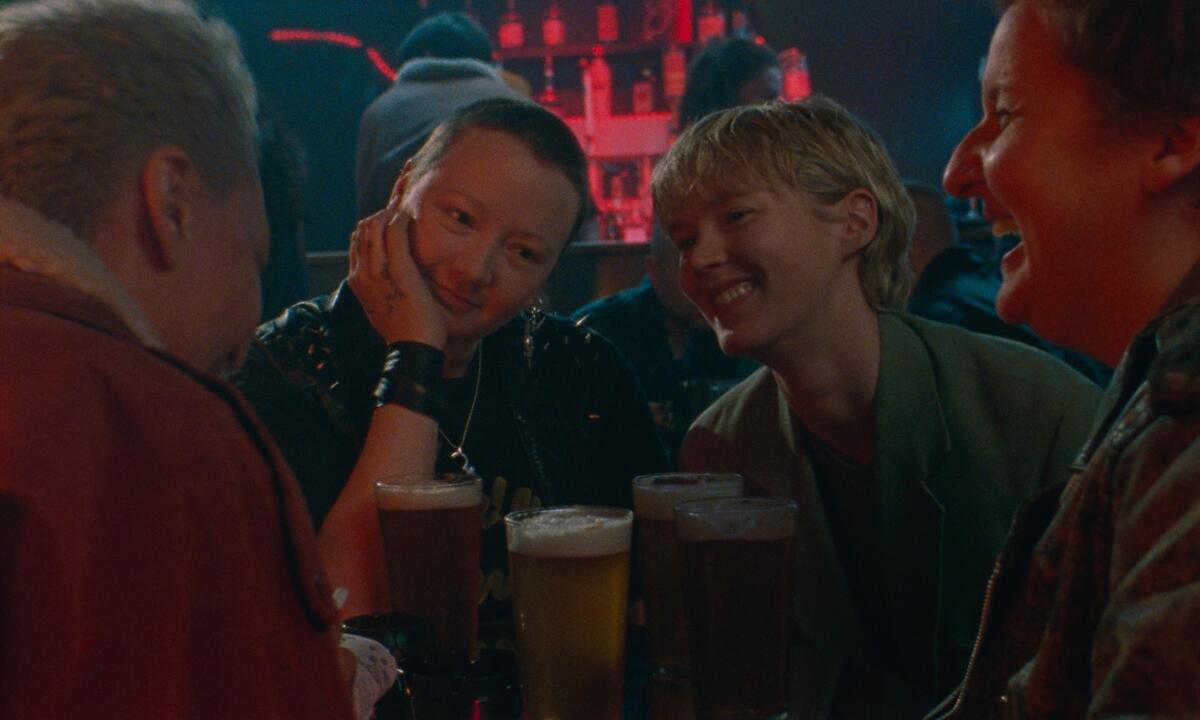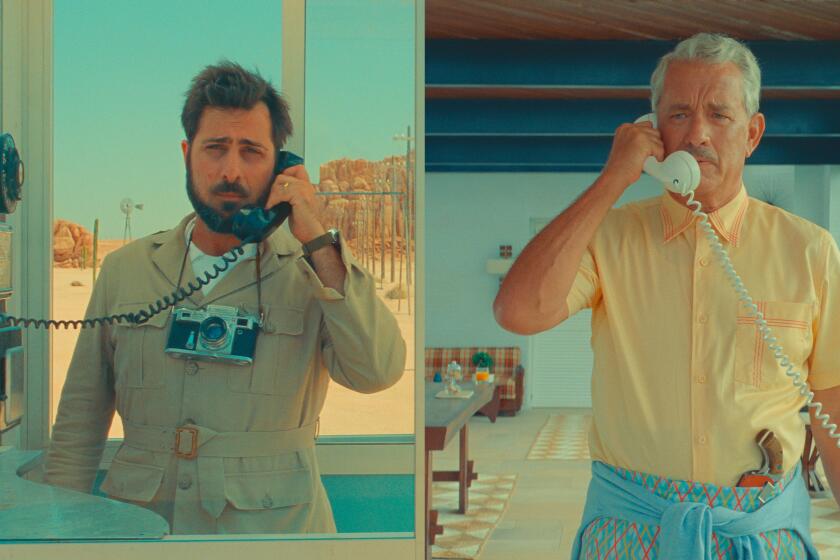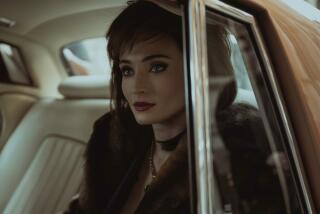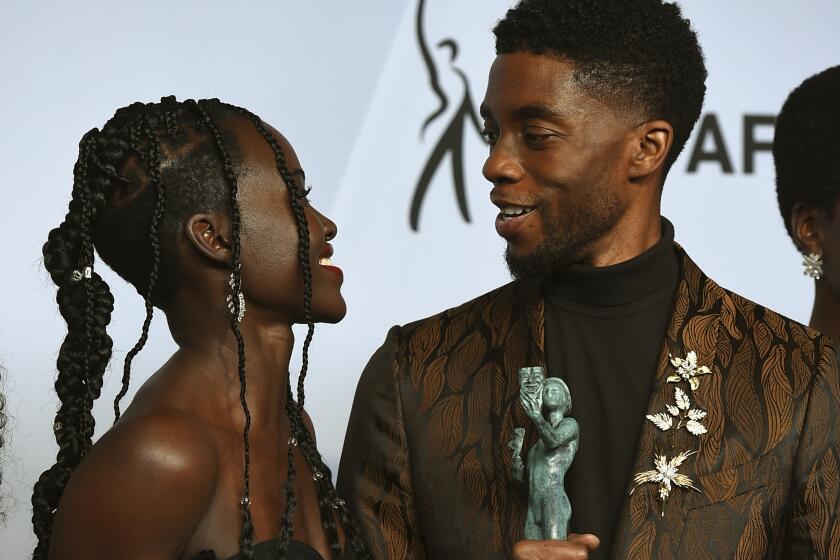Review: Retro ‘Blue Jean’ resonates with current anti-LGBTQ+ threats

What’s especially pernicious about legislation attacking sexual orientation is when it triggers a cruel self-policing in the targeted groups. That fragile submission to conformity in a half-out, half-fearful lesbian PE teacher is the steadily tense heartbeat of “Blue Jean,” a confident, moody and superbly acted debut feature from Georgia Oakley set in England in 1988, when Conservative Prime Minister Margaret Thatcher turned stigmatization of gays and lesbians into national law under the specious rubric of protecting schoolchildren by banning the “promotion” of homosexuality as a “pretended family relationship.”
Clause 28 eventually would be fully repealed across the U.K. by 2003, but the gurgling late-’80s atmosphere of scaremongering that writer-director Oakley evokes won’t seem so long ago to anyone outraged by the “Don’t Say Gay” bill Florida passed last year and, in our current political era, its noxious influence across right-wing America. That framing makes “Blue Jean,” while set in the past, an unnervingly present movie. But in its specific character study, it also suggests a potentially dangerous future as well if things worsen — mostly because our protagonist finds herself ill-equipped to fight, either for herself or for those in her sphere of influence whose protection from harm is in her job description.
By day, Jean Newman (Rosy McEwen) manages a rowdy gym class of secondary school girls with stiffly observant authority, focused on maintaining a top-notch netball squad — think basketball without dribbling — while avoiding overt camaraderie with fellow teachers. By night, her sweats and stern looks replaced by smiles and clubwear, she’s a gay bar habitué with her lesbian clique, a raucous pool-playing bunch that includes her butch girlfriend, Vivian (the magnetic Kerrie Hayes).
It’s a delicate double life Jean leads, especially with the recent Clause 28 news spurring a freshly heightened watchfulness for disturbances — gossip, jokes, stares — in the fabric of her daily routine. Even the comfort of home isn’t always a given. When sexy time with Viv is interrupted by an impromptu door knock from Jean’s sister (Aoife Kennan) with 5-year-old nephew and a babysitting request in tow, Jean’s first impulse is to ask Vivian to hide. It’s a request with ripple effects for their relationship.
The writer-director’s 1955-set feature, starring Jason Schwartzman, Scarlett Johansson, Tom Hanks and many others, toggles between a desert town and a New York soundstage.
Jean’s carefully compartmentalized existence intensifies further with the arrival of new student Lois (an intensely good Lucy Halliday), who’s lonely-looking, a natural at sports and readily bullied by star player and alpha girl Siobhan (Lydia Page). But Lois is quick to push back too, verbally and physically — a defensive stance that complicates Jean’s sense of responsibility when it becomes clear to her what other “team” Lois plays on, and Jean realizes how unprepared she is to be any kind of role model, or even an ally.
With the boundary-monitoring reaching crisis points in both Jean’s private and professional lives, McEwen offers up a riveting performance so physically fine-tuned to shades of guardedness and disintegration it’s like watching a rashly trained spy from a John le Carré story — one where a meticulous façade gives way to hard lessons about honesty and betrayal. Oakley’s interrogating approach of a moral moment and McEwen’s portrayal of see-through armor help us understand the viewpoint of someone who was never going to be a hero but who could tragically internalize a rising hatred that might upend her life at any moment.
You can feel it too, in the pinched, retro naturalism of Victor Seguin’s 16-millimeter cinematography and Oakley’s cool pacing, which give “Blue Jean” a stylistic kinship to the angry intimacy of ’80s British social realism while keeping pace with the strides in modern female portraiture forged by the likes of Kelly Reichardt, Eliza Hittman and Celine Sciamma. The music does its part, toggling between era-specific jams conveying hard-edged freedom and composer Chris Roe’s paranoid orchestral strains. The cues can be overbearing at times, but they never detract from the compassionate, tough experience at hand, watching someone with a threatened identity struggle with the limits of her forward-facing self.
'Blue Jean'
Not rated
Running time: 1 hour, 37 minutes
Playing: Landmark Nuart, West Los Angeles
More to Read
Only good movies
Get the Indie Focus newsletter, Mark Olsen's weekly guide to the world of cinema.
You may occasionally receive promotional content from the Los Angeles Times.











